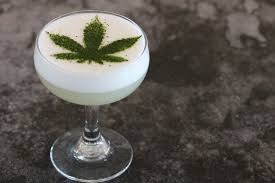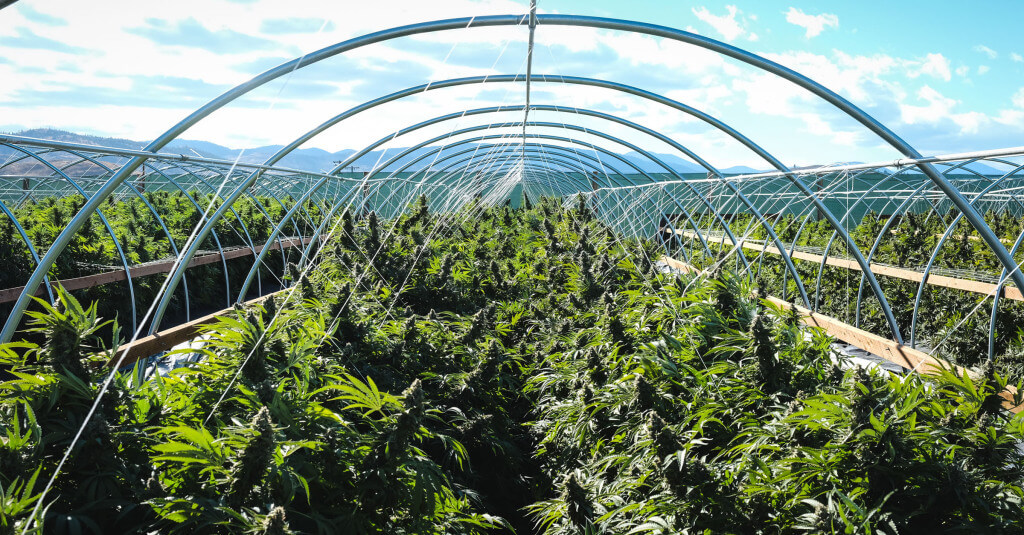Last week there was a weed conference in New York City. I put a request into my publicist friend attending, “Edibles!”
Instead she invited me to an after-party, complete with secret password, in a not-so-secret place in Tribeca. There would be infused cocktails. I surveyed the options, even though it was vividly chick-red, I went with the Strawberry Fields Forever, seduced by the promise of rhubarb.

No surprise to anyone, everyone wants a piece of the upcoming new business that has saved Colorado’s financial ass. The pot industry. This past January, I participated in a Market Disruption panel lead by the industry firecracker, Gilian Handelman where she predicted that pot and not climate change nor natural wine would be the next biggest disruption to wine future.
“The top pot geneticists of the world are here,” I was told several times as I tried to engage people in the darkened room. It was surprisingly easy for this shy person, especially with my engaging, brilliant friend leading the way. Always on the lookout for what’s new and spot-on in health and wellness, pot is right up there at the top of her chart. Meanwhile, for me, totally different than my usual wine events, I relished in ways to streamline the potency to cure a spectrum of ills.
I had to put my drink down. Far too sweet. I tried the kale oriented Go Green next.
I could have been in a room of investment bankers, most were not scruffy young, but clean cut professionals with a certain Portland sheen. Very nice, polite, looking to make deals and business. I was the odd woman out. About three people made the point to me that just because geneticists are big in the pot world, it’s not GM. Yes, I know. I know. But still, let’s talk.
I shared my story about a London-based friend. A few years back, driven by desperation she started to grow pot in her flat’s attic. She was determined to work in biodynamics. Along the way were perils; mites and scale and all sorts of maladies. Biodynamics in an unnatural roof was challenging.
I have also successfully solved my thripp issue with Neem oil and although the Camomile has started to look a bit limp and unhappy, everything else in the main tent and the mother tent is looking pretty damn good. My wormery has also finally started working as I think it should so I am hoping that by the next crop, I will be able to feed them on a diet of pure worm food which is pretty premium stuff and which they will be getting fresh.
They seemed to have found the story as charming, if a bit simple. Maybe they were being polite. Meanwhile I cherish her emails to me about her journey. A fight for terroir where terroir did not exist.
I put down the kale as well. If I’m drinking hooch, I want to taste the hooch, not simple syrup. Like the first time someone gave me pot wine, tasted blind. I took a whiff and exclaimed, “Stems!” Took a sip, went a little cock-eyed and asked, “Pot wine?”
Much of the talk that night was about the search for complexity and tasting notes. I thought, now there’s a way I could get out of the wine biz, go to pot. Smell, give descriptors, the kind I resist doing with wine. I could describe the fruit, the savory, the nuance. Give my nose a good working out and stretch my poesy. I started to get excited, until I met a true pro and realized I couldn’t measure up.
I talked about blind tasting with one gentlemen, the head of a pot company that remained to me nameless, as he did. No card was given when I requested one, which is too bad as I enjoyed the conversation and would love to do a story on him.
He was second generation pot pro. His dad had been a surfer to landed in the “job” in Anderson Valley about 30 years ago. “The biggest problem in our field is that there are no regulations. You can make any claim on where the pot comes from or which strain, but how can you authenticate? However, much like Garrett Oliver can identify yeast strains in beer, he boasted that he could walk into a room, take a sniff and blind identify any weed burning.

“Our industry is going into terroir, just like yours,” he added.
This was going to be an industry talking point, but I wasn’t so sure of its validity. I pushed back a little. “How can you talk of terroir if you irrigate? How can you talk of terroir if you’re developing clones and plant entire fields to that clone? Not to say anything about chemical pesticides. If you’re a true environmentalist, aren’t you worried about losing the biodiversity?”
“Of course,” he said. Then he indicated he had that covered.
In the not-so-old days when his dad was growing, perhaps terroir did have something to do with it. That was when Panama Red meant something. But these days?
I’m not so sure.
We changed partners.
Going down the line there will be the pot purist/naturalist just as in the wine world. Being organic won’t be enough. I can see the terroir argument, surely, but that means the public should be willing to accept vintage variations and celebrate them, just as in wine. Until we go there, we can’t talk of terroir, we can only talk of clones. And clones did quite a bit of damage to the vine.
But I’d love to help develop infusions, one where the stems are a part of the recipe, but that’s because I have an incurably savory palate. Let’s keep it identifiable and authentic. I’m up to the job.